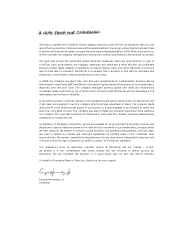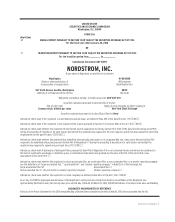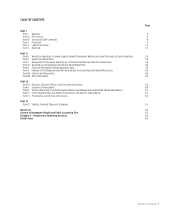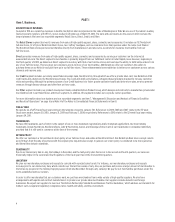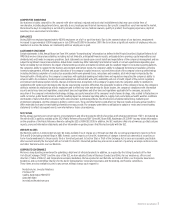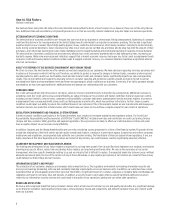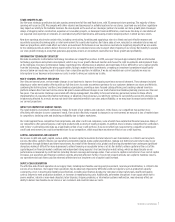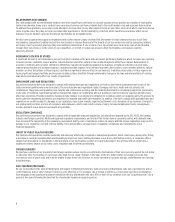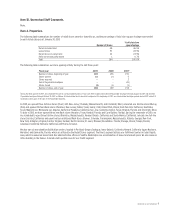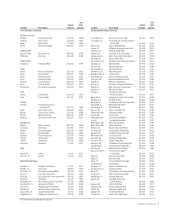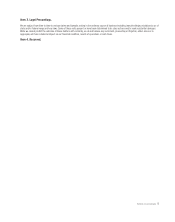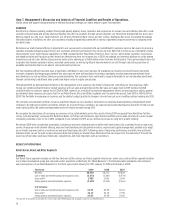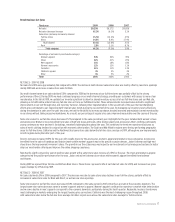Nordstrom 2009 Annual Report Download - page 16
Download and view the complete annual report
Please find page 16 of the 2009 Nordstrom annual report below. You can navigate through the pages in the report by either clicking on the pages listed below, or by using the keyword search tool below to find specific information within the annual report.8
RELATIONSHIPS WITH VENDORS
Our relationships with our merchandise vendors have been a significant contributor to our past success and our position as a retailer of high-quality
fashion merchandise. Some of our vendors have experienced serious cash flow problems due to the credit market crisis and economic deterioration.
To address these problems, our vendors could attempt to increase their prices, alter payment terms or seek other relief, all of which could increase our
costs. In some cases, they may be forced to reduce their operations or file for bankruptcy protection, which could have an adverse effect on our
business if we are unable to procure the desired merchandise on acceptable terms.
We also have no guaranteed supply arrangements with our key vendors, many of whom limit the number of retail channels they use to sell their
merchandise. Competition to obtain and sell this merchandise is intense. Nearly all of the brands of our top vendors are sold by competing retailers,
and many of our top vendors also have their own dedicated retail stores. If one or more of our top vendors were to increase sales of merchandise
through their own stores or to the stores of our competitors, or to limit or reduce our access to their merchandise, our business could be
adversely affected.
GEOGRAPHIC LOCATION OF STORES
A significant amount of our total sales is derived from stores located on the west and east coasts, particularly California, which increases our exposure
to local economic conditions, severe weather, natural disasters and other natural or man-made disruptions within these regions. Deterioration in
economic conditions and consumer confidence within these regions has negatively impacted our business, including a reduction in overall sales,
reduced gross margins and increased expenses, including bad debt expense. Any continued economic deterioration, severe weather patterns, natural
disasters or other disruptions in these regions, could have a significant adverse effect on our business. In addition, many states in these regions are
facing significant budget shortfalls, and may seek to address those shortfalls through unfavorable changes in tax laws and interpretation of existing
laws which could adversely affect our results of operations.
EMPLOYMENT LAWS AND REGULATIONS
Our policies and procedures are designed to comply with employment laws and regulations set forth by the federal government and in each of the
states and municipalities where we do business. These include laws and regulations related to wages and hours, meals and rest periods, and
commissions. These laws and regulations are complex and continuously evolving, and the related enforcement is increasingly aggressive, particularly
in the state of California. Significant legislative changes that impact our relationship with our workforce could increase our expenses and adversely
affect our operations. Possible legislative changes include changes to an employer’s obligation to recognize collective bargaining units, the process by
which collective bargaining agreements are negotiated or imposed and health care mandates. In addition, if we fail to comply with applicable laws and
regulations we could be subject to damage to our reputation, class action lawsuits, legal and settlement costs, disruption of our business, changes to
our employment practices, and loss of customers and employees, which could result in a loss of sales, increased employment costs, low employee
morale, and harm to our business and results of operations.
REGULATORY COMPLIANCE
Our policies and procedures are designed to comply with all applicable laws and regulations, including those imposed by the SEC, NYSE, the banking
industry and foreign countries. Additional legal and regulatory requirements, and the fact that foreign laws occasionally conflict with domestic laws,
have increased the complexity of the regulatory environment and the cost of compliance. Failure to comply with the various regulations may result in
damage to our reputation, civil and criminal liability, fines and penalties, increased cost of regulatory compliance and restatements of our
financial statements.
IMPACT OF PUBLIC HEALTH CONCERNS
Our business and operations could be materially and adversely affected by a regional or widespread pandemic, which could cause, among other things,
a decrease in consumer spending that would negatively impact our sales; staffing shortages in our stores, distribution centers, or corporate offices;
supply chain disruptions; or disruptions in the operations of our merchandise vendors or property developers. Any of these effects could have a
significant adverse impact on our sales, costs, reputation and long-term growth plans.
FOREIGN CURRENCY
We purchase a portion of our inventory from foreign suppliers whose cost to us is affected by fluctuations of their local currency against the U.S. dollar
or who price their merchandise in currencies other than the U.S. dollar. Changes in the value of the U.S. dollar relative to foreign currencies may
increase our cost of goods sold, and if we are unable to pass these cost increases on to our customers, our gross margins, and ultimately our earnings,
would decrease.
ANTI-TAKEOVER PROVISIONS
We are incorporated in the state of Washington and subject to Washington state law. Some provisions of Washington state law could interfere with or
restrict takeover bids or other change-in-control events affecting us. For example, one provision prohibits us, except under specified circumstances,
from engaging in any significant business transaction with any shareholder who owns 10% or more of our common stock (an “acquiring person”) for a
period of five years following the time that the shareholder became an acquiring person.


